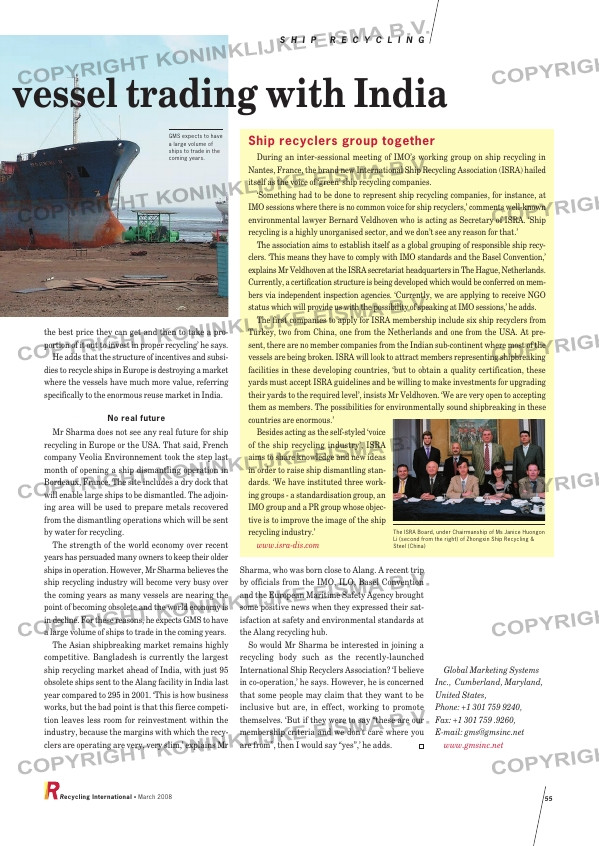Page 55 from: March 2008

the best price they can get and then to take a pro-
portion of it out to invest in proper recycling’ he says.
He adds that the structure of incentives and subsi-
dies to recycle ships in Europe is destroying a market
where the vessels have much more value, referring
specifically to the enormous reuse market in India.
No real future
Mr Sharma does not see any real future for ship
recycling in Europe or the USA. That said, French
company Veolia Environnement took the step last
month of opening a ship dismantling operation in
Bordeaux, France. The site includes a dry dock that
will enable large ships to be dismantled. The adjoin-
ing area will be used to prepare metals recovered
from the dismantling operations which will be sent
by water for recycling.
The strength of the world economy over recent
years has persuaded many owners to keep their older
ships in operation. However, Mr Sharma believes the
ship recycling industry will become very busy over
the coming years as many vessels are nearing the
point of becoming obsolete and the world economy is
in decline. For these reasons, he expects GMS to have
a large volume of ships to trade in the coming years.
The Asian shipbreaking market remains highly
competitive. Bangladesh is currently the largest
ship recycling market ahead of India, with just 95
obsolete ships sent to the Alang facility in India last
year compared to 295 in 2001. ‘This is how business
works, but the bad point is that this fierce competi-
tion leaves less room for reinvestment within the
industry, because the margins with which the recy-
clers are operating are very, very slim,’ explains Mr
Sharma, who was born close to Alang. A recent trip
by officials from the IMO, ILO, Basel Convention
and the European Maritime Safety Agency brought
some positive news when they expressed their sat-
isfaction at safety and environmental standards at
the Alang recycling hub.
So would Mr Sharma be interested in joining a
recycling body such as the recently-launched
International Ship Recyclers Association? ‘I believe
in co-operation,’ he says. However, he is concerned
that some people may claim that they want to be
inclusive but are, in effect, working to promote
themselves. ‘But if they were to say “these are our
membership criteria and we don’t care where you
are from”, then I would say “yes”,’ he adds.
S H I P R E C Y C L I N G
Recycling International • March 2008 55
Ship recyclers group together
During an inter-sessional meeting of IMO’s working group on ship recycling in
Nantes, France, the brand new International Ship Recycling Association (ISRA) hailed
itself as the voice of ‘green’ ship recycling companies.
‘Something had to be done to represent ship recycling companies, for instance, at
IMO sessions where there is no common voice for ship recyclers,’ comments well-known
environmental lawyer Bernard Veldhoven who is acting as Secretary of ISRA. ‘Ship
recycling is a highly unorganised sector, and we don’t see any reason for that.’
The association aims to establish itself as a global grouping of responsible ship recy-
clers. ‘This means they have to comply with IMO standards and the Basel Convention,’
explains Mr Veldhoven at the ISRA secretariat headquarters in The Hague, Netherlands.
Currently, a certification structure is being developed which would be conferred on mem-
bers via independent inspection agencies. ‘Currently, we are applying to receive NGO
status which will provide us with the possibility of speaking at IMO sessions,’ he adds.
The first companies to apply for ISRA membership include six ship recyclers from
Turkey, two from China, one from the Netherlands and one from the USA. At pre-
sent, there are no member companies from the Indian sub-continent where most of the
vessels are being broken. ISRA will look to attract members representing shipbreaking
facilities in these developing countries, ‘but to obtain a quality certification, these
yards must accept ISRA guidelines and be willing to make investments for upgrading
their yards to the required level’, insists Mr Veldhoven. ‘We are very open to accepting
them as members. The possibilities for environmentally sound shipbreaking in these
countries are enormous.’
Besides acting as the self-styled ‘voice
of the ship recycling industry’, ISRA
aims to share knowledge and new ideas
in order to raise ship dismantling stan-
dards. ‘We have instituted three work-
ing groups – a standardisation group, an
IMO group and a PR group whose objec-
tive is to improve the image of the ship
recycling industry.’
www.isra-dis.com
e vessel trading with India
GMS expects to have
a large volume of
ships to trade in the
coming years.
The ISRA Board, under Chairmanship of Ms Janice Huongon
Li (second from the right) of Zhongxin Ship Recycling &
Steel (China)
Global Marketing Systems
Inc., Cumberland, Maryland,
United States,
Phone: +1 301 759 9240,
Fax: +1 301 759 .9260,
E-mail: [email protected]
www.gmsinc.net
RI_053 Shipbreaking:Opmaak 1 28-02-2008 15:37 Pagina 55



